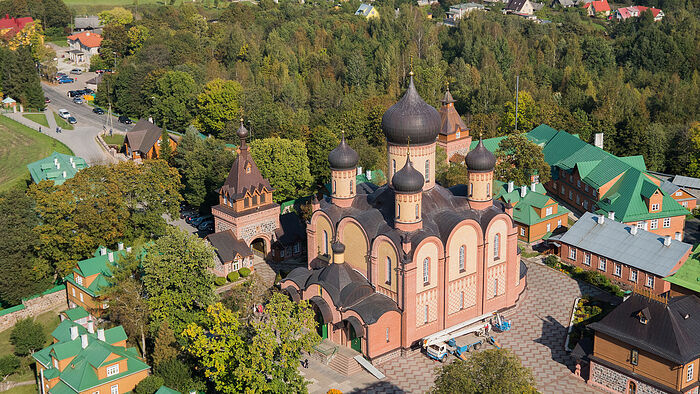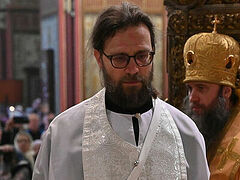Kuremäe, Estonia, April 24, 2024
Yesterday morning, a delegation from the Estonian Ministry of Internal Affairs, led by Minister Lauri Läänemets, arrived at the Holy Dormition-Pukhtitsa Monastery in Kuremäe, Estonia, to discuss the future of the monastery in terms of its ecclesiastical jurisdiction.
Pukhtitsa Monastery was founded in 1891, with much assistance from St. John of Kronstadt. Besides the Pskov Caves Monastery, it is the only holy habitation to have never closed during the long decades of atheist Bolshevik rule.
However, now the monastery faces the possibility of closure because of its canonical status. Though on the territory of Estonia, Pukhtitsa is a stavropegial monastery, meaning it falls directly under the episcopal oversight of His Holiness Patriarch Kirill of Moscow and All Russia.
Following the publication of the document, “The Present and Future of the Russian World,” from the World Russian People’s Council public forum, chaired by Pat. Kirill, which speaks of a “holy war” in Ukraine, the Estonian government has ramped up efforts to expel the Moscow Patriarchate.
There have been two Orthodox jurisdictions in Estonia since the Patriarchate of Constantinople established a structure parallel to the already existing Church under the Moscow Patriarchate in 1996. And now, although the government has repeatedly stated that it sees no real security threat from the Estonian Orthodox Church, it is nevertheless meeting with parish and monastery communities to try to convince them to change jurisdictions and join Constantinople.
Interior Minister Läänemets initially spoke of designating the Moscow Patriarchate a “terrorist organization,” and a bill is currently before the Parliament calling it an accomplice to Russian aggression. There have been conflicting voices from within the government at various levels, with some claiming the churches will remain open even if they don’t join Constantinople, while others voice threats of closure. The mayor of Tallinn has already terminated the lease for the Metropolitan’s office.
For Läänemets, Pukhtitsa and the Estonian Orthodox Church are subordinate not only to Pat. Kirill, but “in fact to the Kremlin regime.”
According to him, the state does not want to increase tensions with the Church, and wants to give communities the chance to “stop this subordination” themselves, he told Estonian outlet err.ee.
“It is impossible to obey a religious leader who declared that the Estonian state should not exist,” the Minister said, though he did not clarify when Pat. Kirill made such a statement.
And although representatives of the Ministry of the Interior have previously promised that no churches will be closed either way, Läänemets told err.ee that if they don’t willingly leave the Moscow Patriarchate, the state “will have to apply through the court for a forced termination of activities.”
At the same time, the Minister acknowledges that a church or monastery cannot simply change its jurisdiction. The hierarchs of the Estonian Church issued a statement earlier this month emphasizing this point—that while it is administered independently in Tallinn, the Church is part of the Moscow Patriarchate and its statutes do not allow it to simply change its own canonical status.
Following the visit from Läänemets, the monastery issued a press release, also making the same point. According to the monastery, led by Abbess Philareta, if the government wants the monastery to cease being stavropegial (a status granted by Estonian-born Patriarch Alexei II), then it is welcome to make its own appeal to Pat. Kirill.
“Such a course is canonically legitimate for the convent’s residents,” the monastery states. At the same time, the monastery stipulates that it can accept no longer being stavropegial, directly under the Patriarch, only if the state guarantees that there will be no pressure about which jurisdiction the monastery then chooses to join.
The press release reads:
On April 23, 2024, at 8 AM, the monastery was visited by the Minister of Internal Affairs of Estonia, Lauri Läänemets, with advisors. The meeting was initiated by the Ministry. Representing the monastery were Abbess Philareta (Kalacheva), the senior priest of the monastery, Igumen Samuel (Karask), the monastery's lawyer, and a translator.
The Minister expressed concerns about the influence on the Orthodox flock of Patriarch Kirill’s statements regarding the “military operation in Ukraine,” as well as the Patriarch’s opinion expressed at the World Russian People’s Council in March of this year. According to the Minister, the purpose of the visit was to discuss possible ways out of the current situation.
Mr. Läänemets stated that the state does not want to escalate the conflict with Orthodox believers, therefore, it proposes to consider renouncing the stavropegial status of the monastery to eliminate the possibility of spiritual influence by Patriarch Kirill of Moscow and All Russia.
Abbess Philareta thanked the Minister and his advisors for the opportunity for dialogue and the government’s desire to find solutions to the problems that have arisen. The Minister’s proposal was responded to as follows:
1. Pukhtitsa Monastery received its stavropegial status from the ever-memorable Patriarch Alexei II in 1990. For the monastery, the memory of this Patriarch is sacred, as during the Khruschev era, being a bishop, he saved the convent from closure. Both sides agreed that during its existence, the Pukhtitsa Monastery has not compromised itself by participating in political actions nor allowed any political forces to manipulate it.
2. The stavropegial status is stipulated in the monastery’s statutes, which state that changing jurisdiction is not possible. Therefore, the monastery itself cannot initiate the renunciation of its stavropegial status.
If the government of the Republic of Estonia, represented by the Minister of Internal Affairs, insists on changing the jurisdiction of the monastery, then as the initiator of the process, the government itself may approach Patriarch Kirill with a proposal to cancel the stavropegial status of Pukhtitsa Monastery. Abbess Philareta noted that such a course is canonically legitimate for the convent’s residents.
It should be noted that for the monastery, the only acceptable outcome of the process of canceling the stavropegial status is a guarantee from the government of the Republic of Estonia of freedom for the monastery to choose its jurisdiction without any pressure in this matter.
Read more about Pukhtitsa Monastery in the articles, “The Amazing and Beautiful Holy Dormition-Pukhtitsa Monastery” and “Pukhtitsa Dormition Convent: An Uninterrupted Tradition of Female Monasticism.”
Follow OrthoChristian on Twitter, Vkontakte, Telegram, WhatsApp, MeWe, and Gab!




